Today (14th December 2011) at 13.30 hrs., Clinical Professor Udom Kachintorn, Dean of Faculty of Medicine Siriraj Hospital, Mahidol University, in the capacity of Vice President of the Prince Mahidol Award Foundation, Mr.Thani Thongphakdi, Director-General of the Department of Information, in the capacity of the Chairman of the Sub-Committee on Public Relations of the Prince Mahidol Award Foundation, and Professor Vicharn Panich, Chairman of the International Award Committee of the Prince Mahidol Award Foundation, held a press conference to announce the 20th Prince Mahidol Award for the year 2011 at the Prince Mahidol Museum, 2nd Floor, Syamindra Building, Siriraj Hospital.
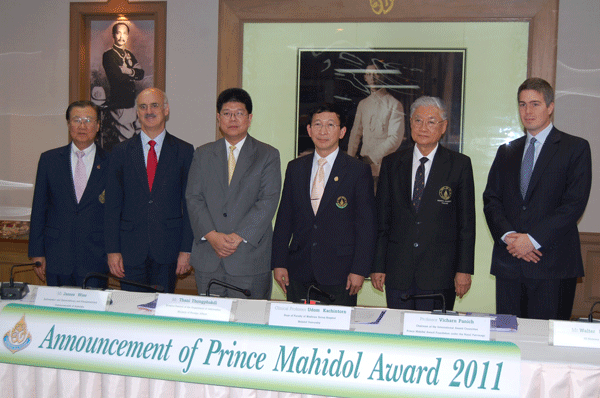
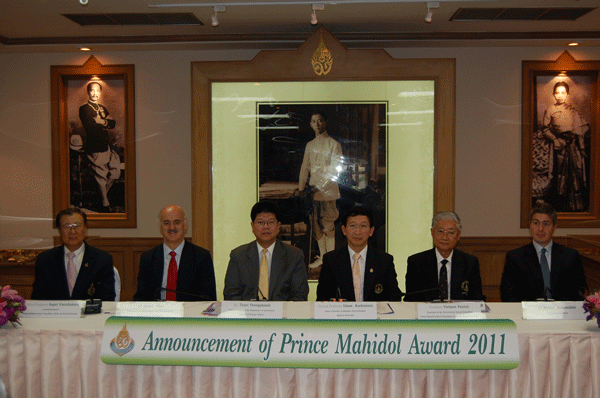
The Prince Mahidol Award Foundation of which H.R.H. Princess Maha Chakri Sirindhorn is the President, has decided to confer this yesr’s Prince Mahidol Award in the field of medicine to Professor Aaron T. Beck and Dr. David T. Wong. In the field of public health, the Prince Mahidol Award is conferred to Dr. Ruth F. Bishop.
There are a total of 76 nominations from 45 countries. The Scientific Advisory Committee carefully screened all candidates from the year 2011, 2010, and 2009 and then submitted a short list of the candidates to the International Award Committee who scrutinized and made a recommendation to the Board of Trustees. H.R.H. Princess Maha Chakri Sirindhorn presided over the meeting of the Board of Trustees on 11th November 2011 in which the final decision on the Prince Mahidol Award 2011 was made. In the past 19 years, 59 individuals, groups of individuals, and institutions have received the Prince Mahidol Award. Among them, two subsequently received the Nobel Prize in Physiology or Medicine, namely Professor Dr. Barry James Marshall and Professor Dr. Harald zur Hausen. Two Thai had received the Prince Mahidol Award in 1996, they were Professor Prasong Tuchinda and Professor Suchitra Nimmannitya and two more in 2009: Dr.Wiwat Rojanapithayakorn and Mr.Mechai Viravaidya. The Prince Mahidol Award Foundation under the Royal Patronage was established in commemoration of the centenary of the birth of His Royal Highness Prince Mahidol of Songkla, on January 1, 1992. The Foundation is under Royal Patronage, with Her Royal Highness Princess Maha Chakri Sirindhorn as president. The Foundation annually confers two Prince Mahidol Awards upon individual(s) or institution(s), which have demonstrated outstanding and exemplary contributions to the advancement of the world’s medical and public health services. Each Award consists of a medal, a certificate and a sum of US $100,000.;
Their Majesties the King and Queen of Thailand have graciously designated Her Royal Highness Princess Maha Chakri Sirindhorn to preside over the Presentation Ceremony of the Prince Mahidol Award 2011 at the Chakri Throne hall on January 25, 2012 at 17.30 hours. Prior to the Ceremony, Siriraj Hospital, as a founder of the Prince Mahidol Award Foundation, will invite the 2011 Prince Mahidol Awardees to give lectures based on their achievement on January 24, 2012.
Their Majesties the King and Queen of Thailand have graciously designated Her Royal Highness Princess Maha Chakri Sirindhorn to preside over the Presentation Ceremony of the Prince Mahidol Award 2011 at the Chakri Throne hall on January 25, 2012 at 17.30 hours. Prior to the Ceremony, Siriraj Hospital, as a founder of the Prince Mahidol Award Foundation, will invite the 2011 Prince Mahidol Awardees to give lectures based on their achievement on January 24, 2012.
The Prince Mahidol Award 2011
In the field of Medicine:
In the field of Medicine:
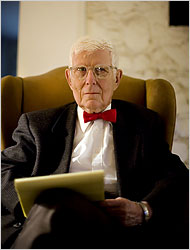
Professor Aaron T. Beck (USA)
Professor Emeritus of Psychiatry, University of Pennsylvania
Honorary President of the Aaron T. Beck Psychopathology Research Center, Pennsylvania
For outstanding contribution in the development of cognitive behavioral therapy
Professor Emeritus of Psychiatry, University of Pennsylvania
Honorary President of the Aaron T. Beck Psychopathology Research Center, Pennsylvania
For outstanding contribution in the development of cognitive behavioral therapy
Professor Aaron T. Beck is the first person who has worked on the method of cognitive behavioral therapy (CBT) to use on patients suffering from depression. He developed CBT in the early 1960s when he was a psychiatrist at the University of Pennsylvania. He researched, developed and tested the efficiency of the method used on patients. This method focuses on how thinking affects the way a person feels and acts, and helps to change their thinking, behavior, and emotional responses to become more rational. Later studies show that CBT is the best method for major depression. CBT has been widely used by psychiatrists and psychotherapists for the treatment of depression. This therapy has helped more than 120 million people suffering from major depression and reduced the rate of suicide among more than 1 million people worldwide every year. Professor Beck has become known as the Father of Cognitive Behavioral Therapy.
In the field of Medicine:
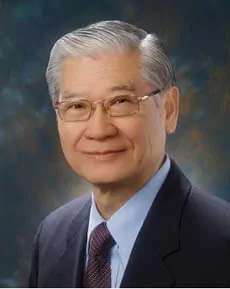
Dr. David T. Wong (USA)
Adjunctive Professor, Neurobiology, Department of Psychiatry,
Indiana University School of Medicine
For outstanding contribution in the discovery of fluoxetine
Adjunctive Professor, Neurobiology, Department of Psychiatry,
Indiana University School of Medicine
For outstanding contribution in the discovery of fluoxetine
Dr. David T. Wong started his study and research in the 1970s and later found fluoxetine, which was the first selective serotonin reuptake inhibitor (SSRI). It then took about 15 years before the US Food and Drug Administration (US FDA) approved fluoxetine for marketing as an antidepressant drug under the trade name “Prozac” in January 1988. In 1990, fluoxetine or Prozac gained its most prescribed antidepressant because of its sustained effectiveness, low side-effect profile, overdose safety and once-a-day dosing. It has been widely used to help more than 100 million depressed patients around the world. Moreover, fluoxetine has become the basic model in developing many antidepressants.
Both cognitive behavior therapy and fluoxetine play a major impact on the treatment of major depression, but the combination of the two gives a more effective and satisfactory result.
The Prince Mahidol Award 2011
In the field of Public Health :
In the field of Public Health :
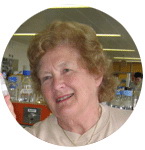
Dr. Ruth F. Bishop (Australia)
Professorial Fellow, Department of Paediatrics, University of Melbourne,
Senior Principal Research Fellow, Murdoch Children Research Institute, Australia
Senior Principal Research Fellow, Murdoch Children Research Institute, Australia
For outstanding work on Rotavirus and vaccine against Rotavirus diarrhea
Dr. Ruth F. Bishop is the first person who discovered that diarrhea in children, which occurs in those younger than 6 years old around the world, is caused by Rotavirus. The virus claims about half a million children’s lives every year, especially in low and lower middle income countries in Africa and Asia. In 1973, Dr. Bishop and her team at Royal Children’s Hospital examined cells from the intestines of children with gastroenteritis under the electron microscope and found that the virus has a round and wheel-like shape, so they named it as “Rotavirus”.
Furthermore, she also discovered the demonstration of protective immunity against severe disease by natural neonatal rotavirus infection. This laid groundwork for vaccine development against Rotavirus. Since 2007, it was mandated that every Australian child must receive the vaccine against Rotavirus diarrhea. At present, the vaccine has been widely accepted and used in more than 60 countries including Thailand, saving lives and providing health care to millions of children worldwide.
Furthermore, she also discovered the demonstration of protective immunity against severe disease by natural neonatal rotavirus infection. This laid groundwork for vaccine development against Rotavirus. Since 2007, it was mandated that every Australian child must receive the vaccine against Rotavirus diarrhea. At present, the vaccine has been widely accepted and used in more than 60 countries including Thailand, saving lives and providing health care to millions of children worldwide.

